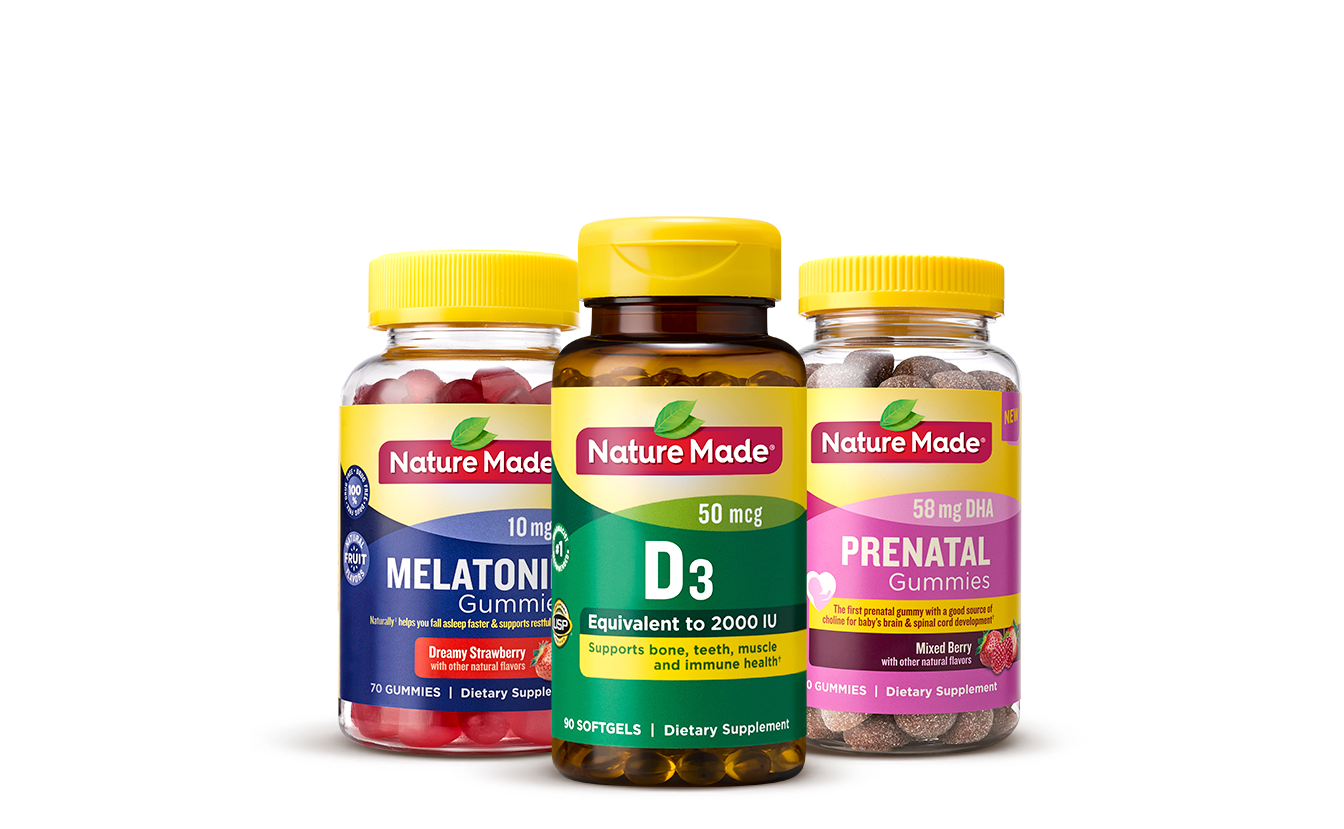If you have unanswered questions about vitamins and supplements, you are not alone. The majority of Americans take supplements daily or occasionally1, yet many aren’t sure which ones to take, how much to take, or even when to take them. To clear up the confusion, below are answers to your most commonly asked questions about vitamins and supplements.
What time of day should I take my supplements?
Most of your supplements—your daily multivitamin, vitamin D or fish oil—can be taken with your largest meal of the day such as breakfast or lunch. The most important point to remember is that you should take these supplements with food in order to help with digestion and absorption. However, not all supplements should be taken with food. There are some exceptions to that rule that you should be aware of. Some supplements should be taken on an empty stomach before a meal. SAM-e, a supplement to help support healthy mood†, should be taken on an empty stomach by at least 30 minutes before you consume food. This is important because taking SAM-e with food may impair the way your body uses SAM-e and consequently its overall effectiveness. If you are taking SAM-e and wondering how to include it in your daily regimen, you might consider taking it in the morning when you first wake up. Your stomach is most empty at this time and you might find this plan to be convenient and feasible for you.
How do I decide which supplements are best for me?
Determining what supplements you should take begins with understanding your diet. You can learn more whether nutrient gaps exist in your diet and what they are by talking to your primary health care provider. To fill potential nutrient gaps, many people choose a daily multivitamin. This tends to be a convenient and effective way to obtain daily nutritional support. If you are looking for an appropriate formula, be sure to find one that is designed to meet your specific age-related and gender needs. For example, iron needs for women over the age of 50 years are 8 mg per day while the needs for women under 50 are 18 mg per day. Multivitamins for women over the age of 50 may contain little to no iron because 8 mg per day can usually be obtained through the diet. A multivitamin for men over the age of 50 may not contain iron and may often include other ingredients that may not be added to a woman’s multi. While a multivitamin is great, some people need more than just a single combination formula. For example, many people today are advised to take extra calcium and vitamin D. Some people cannot tolerate milk, one of the most rich food sources of calcium, and many people fail to maintain sufficient levels of vitamin D. Although a multivitamin tends to provide both nutrients, it may not deliver enough of each to keep your levels adequate. In addition, a multivitamin is typically formulated with a blend of vitamins and minerals only—not other nutrients like omega-3 fatty acids or coenzyme Q10. If you don’t consume at least two to three servings of fatty fish (i.e. salmon, anchovies, sardines) each week, then you might benefit from taking a daily fish oil supplement. Certain statin drugs can lower levels of coenzyme Q10—a nutrient that helps support heart function and cellular energy production†. Thus, if on a statin drug, taking a coenzyme Q10 supplement could be very beneficial. Again, be sure to talk to your primary health care professional when deciding on a safe and effective supplement program.
How much is too much?
Many supplements can be safely taken in amounts greater than the Recommended Daily Value (DV). The percent daily value (%DV) displayed on the label indicates what percent of the recommended intake amount for that nutrient is met per serving. Numerous studies have shown that taking certain nutrients in amounts greater than 100% DV may have health support benefits. For example, consuming higher levels of Vitamin C, an antioxidant and essential nutrient, may help support the immune system.† When taking vitamins, it is important to follow the suggested use and to consider the Upper Limit (UL), which is the highest amount that can be safely consumed. Before taking any vitamin or supplement, be sure to carefully review the precautions and instructions available on the product’s label. If you have any questions, consult your primary health care provider or pharmacist.
Can I take supplements with my current medications?
Inform your primary health care provider about all the dietary supplements you take, even if you take them infrequently. This is especially important because some dietary supplements may interfere with prescription medications and over-the-counter (OTC) drugs causing those prescriptions and OTCs to be less effective. On the other hand, some medications cause certain nutrients levels to drop and so taking supplements can help support nutrient needs and overall health when taking such drugs. Some statin drugs, for example, have been known to lower blood levels of coenzyme Q10. To that end, individuals taking statin drugs are often advised to supplement with coenzyme Q10. It’s important to let your doctor know the dosage and the frequency of use for all the supplements you are taking. Talk to your doctor or pharmacist about potential nutrient depletions that may occur with your medication(s) so you can be sure to supplement wisely and restore those nutrient levels.
Can I take supplements after the expiration date?
Once a product expires, it is not necessarily harmful to consume. However, the active ingredients may no longer be up to their labeled potency. In the case of an expired product, it is best to discard that product and purchase a new batch. When purchasing supplements, always check the expiration date printed on the label, as some products may expire within a year from the date of purchase.
Can I cut supplement tablets in half if I can’t swallow them whole?
The vast majority of supplements may be cut in half, crushed, or chewed if swallowing is a challenge. Softgels that are too large to swallow may be punctured or cut in half to release the contents into a spoon or food source. The only products of exception are those that are timed-release or enteric coated. Such supplements should be swallowed whole for optimal product effectiveness.
Where is the best place to store supplements?
Storage directions are commonly explained on the supplement label. In general, storing a bottle in a cool, dry place with the lid tightly sealed is advised. Be aware that some formulations may require special conditions and always keep supplements out of reach of children and pets.



